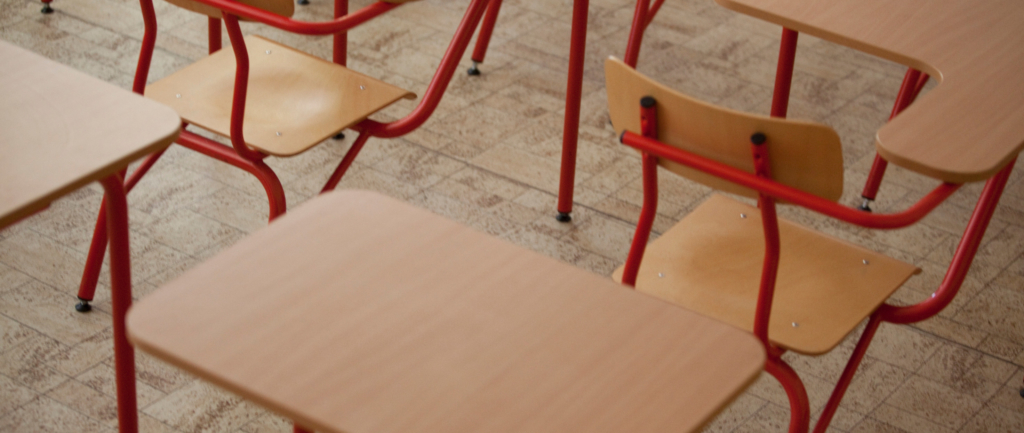By Nicolas Beger, Director of Amnesty International’s European Institutions Office
My colleagues recently told me about a young girl Jana* whom they had met. She told them of how she had been called ‘black mouth’, been told she ‘looked disgusting’, and had had her shoes hidden by her class-mates, leaving her barefoot in the snow. When her family raised this with the school, nothing was done. When Jana’s brother Karol* defended his sister, he felt unsupported. Other pupils told them they were dirty and smelled bad. When the teachers found out, they told the children they did not fit in, and their grades dropped.

This story was not an isolated incident of peer bullying, but an injustice experienced by so many children on a daily basis. It was and is discrimination, something that so many Romani children across the Czech Republic, and elsewhere in Europe, face in schools, where they are supposed to feel safe and supported.
Discrimination towards Romani pupils in the Czech education system takes a variety of forms. It includes the racist bullying experienced by Jana and Karol. Other children are incorrectly placed in schools for pupils with ‘mild mental disabilities’, so-called ‘practical schools’, in clear breach of Czech, European Union (EU), and international human rights anti-discrimination legislation.
In fact, today marks seven years since the European Court of Human Rights found the Czech Republic to be in breach of the European Convention on Human Rights regarding discrimination of Romani pupils in education.
The D.H. and Others v. the Czech Republic case involved a group of primary-school Roma pupils in Ostrava (the third largest city in the country) who were placed in schools for children with ‘mild mental disabilities’. The Court ruled that, in the absence of the necessary safeguards, placing Romani children in such schools amounted to discrimination.
Yet, seven years on, discrimination is ongoing. Romani pupils continue to be over-represented in schools for pupils with ‘mild mental disabilities’ across the country. The government claims it has strengthened the safeguards against arbitrary placements in such schools, including the need for parental consent. However, some Romani parents still report being pressured to have their children tested’ in assessment centres.
On a recent visit to Děčín, in the north of the Czech Republic, Amnesty International met Tereza*. After her eldest son was transferred to a school for children with ‘mild mental disabilities’, having missed classes following a broken leg and surgery, she was determined not to let history repeat itself with her younger son, Dan*. Despite pushing for Dan to remain in mainstream education, the director told Tereza that she didn’t want him in the school, and didn’t have the resources ‘to be bothered’ with him. Currently, both sons of Tereza attend a ‘practical school’.
The prospects for Romani children who do make it to mainstream education aren’t much better. Many are segregated into ‘Roma only’ schools or classes with lower educational standards, with Romani parents given little choice as to where to send their children.
In January 2014, a primary school in Ostrava rejected 12 children at registration; 10 were Roma. All the children lived in the catchment area. Officially, the rejection was on the grounds of school capacity. Unofficially, the director indicated his resistance towards their enrolment well before the registration; he told the coordinator of a NGO project that works to place Romani children in ethnically mixed schools that the children should be placed in ‘their schools’. The director also told Amnesty International that he was concerned about getting a reputation for having a ‘Roma’ school.
Racism, segregation, and rejection: this is the reality of Romani children in the Czech Republic. Education is a human right that belongs to all children equally. Discrimination through segregated education is not only unlawful, it leads to limited education and future employment opportunities, trapping Romani children in a vicious cycle of exclusion and marginalisation.
There is however some hope.
On 25 September, the European Commission announced that it would initiate infringement proceedings against the Czech Republic for breaching EU anti-discrimination legislation with respect to discrimination towards Romani children in education. Nationally, there are ongoing reforms to the Czech School Act aiming to ensure the inclusion of pupils with special education needs in mainstream schools.
It will be key for the Commission to follow its words with concrete and consistent action to protect current and future generations of Roma in the Czech Republic, and across the EU. And for the Czech Republic to specifically address the existence of and tackle ethnic discrimination and segregation in the country’s schools in reforming the Czech School Act, a critical omission which if not rectified will continue to place the country in breach of its legal obligations.
For Jana and Karol, their situation remains bleak. As the bullying continued, they started skipping classes. Eventually they accumulated too many unexcused absences and social services intervened, taking the children away from their parents, and placing them into an orphanage.
On today’s anniversary, we must ensure that another seven years do not go by before this dark chapter in the history of the Czech Republic’s education system is closed, so all children can finally enjoy the right to education.
*The names of people quoted have been changed.
This originally appeared in New Europe on 13 November 2014.
Read more:
Czech Republic must put an end to unlawful segregation of Romani children (Public statement, 12 November 2014)EU action against Czech Republic for discrimination in schools is a victory for rights, justice, and Roma (News story, 25 September 2014)
Czech Republic: Action not words needed to end discrimination against Roma in schools (News story/report, 9 November 2012)
Roma: Demanding equality and human rights (Campaign page)


